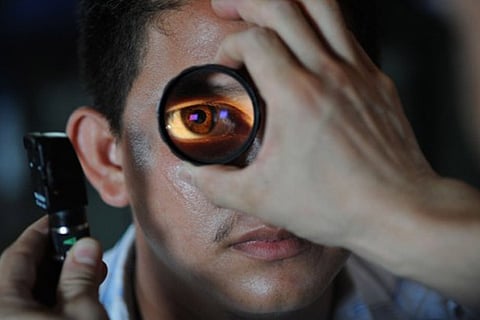

Chennai
With the ageing population increasing, cataract will continue to be a growing burden. Cataract is attributed to ageing and is characterised by the clouding of the eye’s natural lens, which lies behind the iris and the pupil.
According to experts, 20 per cent of the blind across the world lives in India. And, the country also has a huge share of those visually handicapped by cataract, says Dr Lionel Raj, Medical Director, Dr, Agarwal’s Eye Hospital, Southern Tamil Nadu region. He says, “If we take 100 visually challenged in India, 50 to 60 per cent of them would be related to cataract.”
A global phenomenon
Dr Niveditha Narayanan, senior cornea consultant, Sankara Nethralaya, says, “Recent data from the WHO shows that cataract cases are growing globally and there is a need to raise awareness about this since it is the most preventable form of blindness. One can attribute their growing number to rising life expectancy.”
Dr Raj adds that while cataract is a disease, it is also an integral part of ageing. “Just like how greying is related to ageing, cataract too is a natural process that sets in with ageing. Every person will have cataract at one point or the other in life,” he adds.
The challenges
Experts say that research and constant field work have made cataract treatment widely available. Almost anyone can now access it. From the time when thick glasses followed cataract surgery, now the treatment options have advanced from intraocular lens to laser. Yet, many with cataract arrive late for treatment. Dr Niveditha attributes the mindset to the lack of understanding among patients, who still think they have to wait for cataract to mature in order to undergo surgery.
Most often, cataract affects one eye and the growth is gradual and if the person doesn’t undergo regular check-ups, they may miss it in the beginning. She says that with latest technique available, cataract can be operated on when it is visually significant and starts affecting vision. “We approach it through a minute hole and with ultrasound energy, it is broken and sucked out. In the capsule where the lens was, we put an artificial foldable lens. There is no need for a stitch and the recovery and healing time are faster. But, if we wait for the cataract to mature, it cannot be sucked in. We have to break it into pieces and this extends the surgery time,” she explains.
Increase awareness
While the National Programme for the Control of Blindness has been working across the country for decades now to alleviate the blindness burden, NGOs and corporates have played an active role too, say experts. The state programme has also been trying to cover every part of Tamil Nadu and bring more people under its ambit.
“The reach of the programme has increased and people are aware. In rural areas, people are more prone to exposure to ultraviolet rays, which is also a huge environmental factor causing cataract. However, in these areas, while there is awareness about the treatment options and the adverse effects of cataract, people don’t come forward for treatment. They fear loss of man hours and wages. In such cases, family support plays a huge role. Educating them on easy recovery would go a long way in increasing compliance rates,” says Dr Isaac Abraham Roy, who heads Dr Agarwal’s Eye Hospital’s Vellore branch.
Types of cataract
While age related cataract is common, there are several other forms of cataract like congenital cataract, complicated cataract (as a result of inflammatory or degenerative disease in the eye), metabolic disorders like diabetes can cause cataract, steroids can lead to cataract and injuries in the eye can also result in cataract.
Visit news.dtnext.in to explore our interactive epaper!
Download the DT Next app for more exciting features!
Click here for iOS
Click here for Android